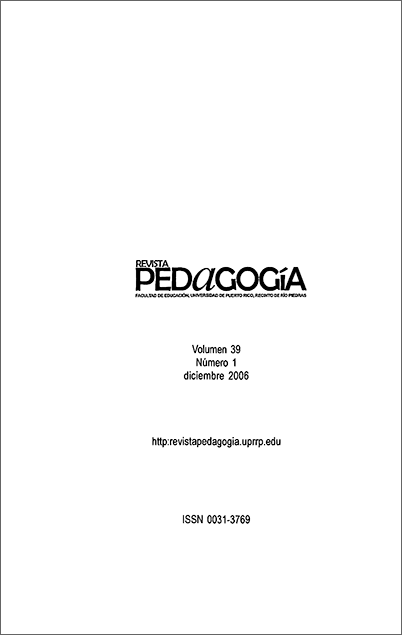Abstract
How to cite:
Serrano-García, I. (2006). Mentorship: A power-ful relationship. Pedagogía, 39(1), 99-124.
References
American Physiological Society. (2003). Guide for mentees. Accessed on August 7, 2005 at www.the-aps.org/careers/careersl/mentor/guide.htm
Arce, R. (2005, 11 de marzo ). Destrezas efectivas para la consejeria de tesis. Presentaci6n realizada en taller del Centro de ExcelenciaAcademica, Universidad de Puerto Rico, Rio Piedras.
Borden, I. & Riledi, K. (2000). The dissertation: An architecture students handbook. Oxford, lnglaterra: Architectural Press.
Campbell, D.E. (2000). The mentoring relationship: Differing perceptions of benefits. College Student Journal, 34(4), 516-522.
Cone, J. & Foster, S. (1993). Dissertations and thesis from start to finish: Psychology and related fields. Washington, D.C.: American Psychological Association.
Cronan-Hillix, T., Gensheimer, L . K., Cronan-Hillix, W, & Davidson, W. S. (1986). Students views of mentors in psychology graduate training. Teaching of Psychology, 13(3), 123-127.
DEGI- Decanato de Estudios Graduados e Investigación. (1997). Guía para el establecimiento de procedimientos pertinentes a tesis y proyectos del Recinto Universitario de Rio Piedras. Rio Piedras, P.R.: Autor.
Dittman, M. (2005). Building mentorships for success. GradPSYH, January, 40-47.
Eby, L., McManus, S., Simon, S. & Russell, J. (2000). The protege's perspective regarding negative mentoring experiences: The development of a taxonomy. Journal of Vocational Behavior, 57, 1-21.
Freire, P. (1970). Pedagogia del oprimido. Buenos Aires, Argentina: Siglo XXI.
Gilbert, L. & Rossman, K. (1992). Gender and the mentoring process for women: Implications for professional development. Professional Psychology: Research and Practice, 23(3), 233-238.
Goodyear, R., Crego, C., & Johnston, M. W. (1992). Ethical issues in the supervision of student research: A study of critical incidents. Professional Psychology: Research and Practice, 23(3), 203-210.
Johnson, W. B., & Huwe, J. M. (2003). Getting mentored in graduate school. Washington, DC: APA.
Johnson, W. B. & Nelson, N. (1999). Mentor-Protege relationships in graduate training: Some ethical concerns. Ethics and Behavior, 9(3), 189-210.
Johnson, W. B . & Ridley, C. (2004). The elements of mentoring. New York, NY: Palgrave Macmillan.
Kitchener, K. S. (1992). Psychologist as teacher and mentor: Affirming ethical values throughout the curriculum. Professional Psychology: Research and Practice, 23, 190-195.
Kram, K. E. (1988). Phases of the mentor relationship. Academy of Management Journal, 26(4), 608-625.
Montero. M. (2004). Introduccion a la psicologia comunitaria: Desarrollo, conceptos y procesos. Buenos Aires, Argentina: Paidós.
Ogden, E. H. (2002). Completing your doctoral dissertation or masters' thesis: In two semesters or less. Lanham, Maryland, Scarecrow Education.
Rappaport, J. (1981). In praise of paradox: A social policy of empowerment over prevention. American Journal of Community Psychology, 9(1), 1-26.
Rogers, M. (1974). Instrumental and infra-resources: The bases of power. American Journal of Sociology, 79(6), 1418-1433.
Rowley, J., & Slack, F. (2004). Conducting a literature review. Management Research News, 27(6), 31-39.
Schlosser, L. Z., Knox, S., Moskowitz, A., & Hill, C. (2003). A qualitative examination of graduate advising relationships: The advisee perspective. Journal of Counseling Psychology, 50(2), 178-188.
Seijo. H. (2005, 11 de marzo ). Consejeria de tesis, un reto que es posible conquistar: Lineamientos generales y un nuevo proyecto. Presentación realizada en taller del Centro de Excelencia Academica, Universidad de Puerto Rico, Rio Piedras.
Serrano-Garcia, I. & López-Sanchez, G. (1990). Una perspectiva diferente del poder y el cambio social para la Psicologia Social-Comunitaria, Revista de Ciencias Sociales, XXJX(3-4), 349-384.
Serrano-Garcia, I. (2004). Community organizing and leadership in Venezuela: A prologue. Journal of Community Prevention and Research. 27(1), xv-xxix.
Serrano-Garcia, I; Lopez, M. M. & Rivera-Medina, E. (1992). Hacia una psicologia social-comunitaria. En I. Serrano-Garcia & W. Rosario Collazo (Eds). Contribuciones Puertorriqueñas a la Psicologia Social Comunitaria. (75-106) Rio Piedras, P.R.: Ed. Universitaria.
Serrano-Garcia,I., López, G & Rosario, W. (1980, septiembre). El Proyecto Buen Consejo: Un escenario de adiestramiento y cambio social. Presentaci6n oral en el Congreso Interamericano de Psicologia, La Habana, Cuba.
Soca, R. (2004). Lafascinante historia de las palabras. Rio de Janeiro, Brasil: Folha Carioca Editora Ltda.
Sosik, J. & Godshalk, V. (2000). The role of gender in mentoring: Implications for diversified and homogenous mentoring relationships. Journal of Vocational Behavior, 57, 102-122.
The Free Dictionary. (2005). Mentee. Accessed on August 7, 2005 at www.thefreedictionary.com
Torres. L. (2000). Resumen de reuniones con facultad y estudiantes del Recinto de Rio Piedras de la Universidad de Puerto Rico. Documento inedito.
U.S. Coast Guard Mentoring Program (1998). How to be an effective mentee. Acessed on August 7, 2005 at www.uscg.mil/hq/g-2/g-wt/g-wtl/mentee.htm
Willis, F. & Diebold, C. T. (1997). Producing mentors in psychology. Teaching of Psychology, 24(1), 15-21.
Young, A. & Perewe, P. (2004). The role of expectations in the mentoring exchange: An analysis of mentor and protege expectations in relation to perceived support. Journal of Managerial Issues, 16(1), 103-126.
Zachary, L. (2000). The mentor's guide: Facilitating effective learning relationships. San Francisco, CA: Jossey-Bass.

This work is licensed under a Creative Commons Attribution-NonCommercial 4.0 International License.

